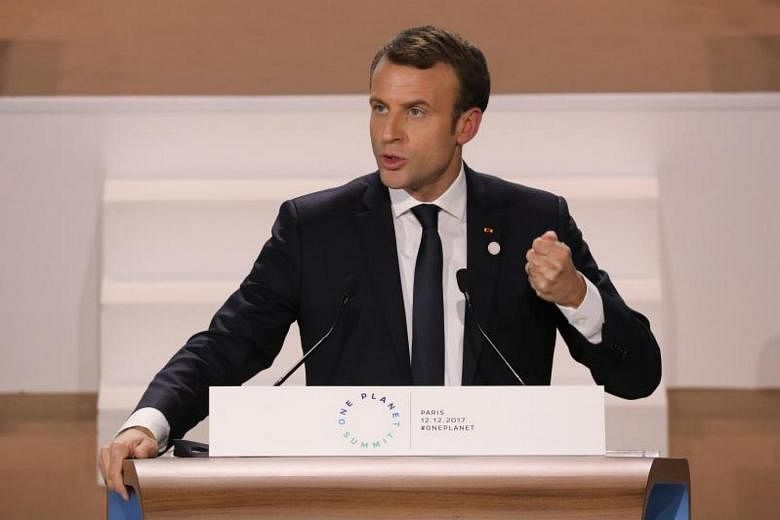PARIS (Reuters, NYTimes, AFP) - French President Emmanuel Macron has delivered a bleak assessment on the global fight against climate change to dozens of world leaders and company executives, telling them: "We are losing the battle".
"We're not moving quickly enough. We all need to act," Macron said on Tuesday (Dec 12), seeking to breathe new life into a collective effort that was weakened this summer when President Donald Trump said he was pulling the United States out of an international accord brokered in the French capital two years ago.
Macron, who has worked to establish his role as a global leader since his sweeping election win in May, said modern-day science was revealing with each day the danger that global warming posed to the planet, he said.
"We are losing the battle," he said at the opening of the one-day climate summit meeting organised here on Tuesday.
He called Trump's decision to pull out of the Paris deal "very bad news", but added that "many have decided to not necessarily accept the American federal government's decision to leave the Paris agreement".
"Second, we are not going fast enough," Macron said.
"What we are starting today is the time of action, because the urgency has become permanent and the challenge of our generation is to act."
Several announcements by states, companies and international organisations were made at the One Planet meeting, aimed at helping industries and poorer countries reduce their greenhouse-gas emissions and at shifting private investment away from fossil fuels toward cleaner, renewable energies.
World Bank president Jim Yong Kim announced to loud applause on Tuesday that the lender, one of the organisers of the meeting, would "no longer finance upstream oil and gas after 2019".
"We're determined to work with all of you to put the right policies in place, get market forces moving in the right direction, put the money on the table, and accelerate action," he said.
Ma Kai, a vice-premier of China, said that his country would start its own carbon market in the coming days.
And Axa, the global insurance giant, announced that it would phase out insurance coverage "for new coal construction projects and oil sands businesses".
Other announcements included the creation of a space observatory for climate research, a five-year initiative of 220 global investors to step up pressure on the 100 companies that emit the most greenhouse gas, and the start of a carbon pricing market, initiated by Mexico, to connect different regions of the Americas that have put a price tag on carbon, including California, Quebec and Ontario.
But the leaders at the summit meeting did not announce new binding requirements to curb carbon emissions and did not unlock significant new funds to help developing countries transition away from fossil fuel economies.
More than 50 heads of state and government attended the gathering, held in a new performing arts centre shaped like a sailboat that sits on an island on the Seine southwest of Paris.
Attendees included United Nations Secretary-General António Guterres; Prime Minister Theresa May of Britain; President Enrique Peña Nieto of Mexico; and Governor Jerry Brown of California. The official US representative was D. Brent Hardt, chargé d'affaires at the US Embassy in Paris.
Businesspeople and philanthropists like Michael Bloomberg and Bill Gates also attended, as did the heads of multinational corporations and banking institutions, and celebrities like Sean Penn.
The Paris climate deal was reached in December 2015, when nearly every country in the world agreed to reduce emissions of planet-warming greenhouse gases. Since then, Nicaragua and Syria, two holdouts in 2015, have said they would join the agreement, leaving only the United States opposed.
Critics called the announcements a vague laundry list of promises, and said that too much public and private funding continued to finance fossil fuels. The criticism comes on the heels of the climate conference in Bonn, Germany, which wrapped up last month with only modest accomplishments.
Still, some said the summit meeting on Tuesday showed increased awareness of climate change issues at the business and local level.
"Cities, regions, companies - everybody is asking what has to be done," said Laurence Tubiana, who was France's top climate change envoy at the 2015 talks in Paris.
"That is a big change."

